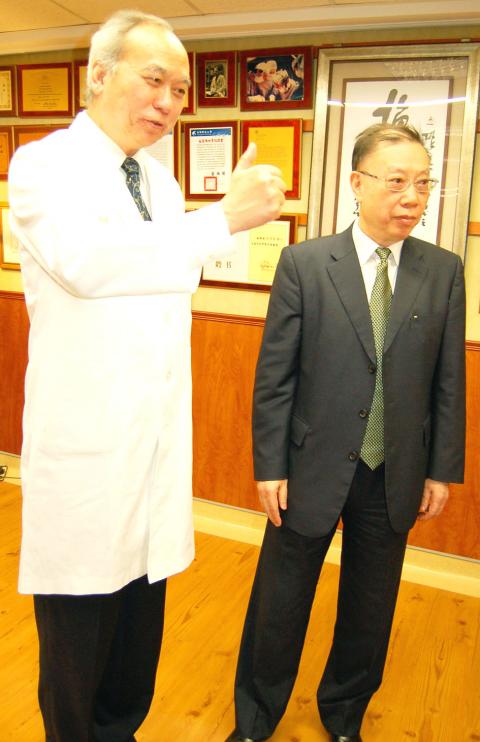A former Chinese vice minister’s offer to help set up a mechanism to facilitate organ donations from China to Taiwan should be viewed with caution, considering its legal and political implications, officials and the head of an organ registry center said.
Speaking at Chang Gung Memorial Hospital in Greater Kaohsiung yesterday, former Chinese deputy minister of health Huang Jiefu (黃潔夫) said that China would cease using organs of executed prisoners next year, and that Beijing hoped to establish a platform to legally transport organs to Taiwan for organ transplant procedures.
Saying that Chinese regulations on organ donations are far looser than Taiwan’s and hinting at China’s greater supply base, Huang said there are about 10,000 organ transplants being carried out in the country annually.

Photo: Chen Wen-chan, Taipei Times
“Although the demand is currently greater than the supply, we believe that the magnanimity of the Chinese people will eventually prevail and allow for greater numbers of organs to be donated after the ban on using organs from executed prisoners,” said Huang, now the head of the National Organ Transplantation Committee at China’s National Health and Family Planning Commission.
“In the eyes of China, both Hong Kong and Taiwan are considered ‘domestic territories,’ and it is quite normal for citizens to donate their organs to one another,” Huang said.
Transportation of the organs — which can be kept in 4oC containers for 16 to 24 hours — would not be a problem, he said.
Responding to Huang’s comments, senior adviser to the Presidential Office Steve Chan (詹啟賢) said he was willing to endorse such a project because it is a “good thing,” but further understanding of legal regulations should be considered.
Taiwan Organ Registry and Sharing Center chairman Lee Po-chang (李伯璋) said that Huang’s comment that people on both sides of the Taiwan Strait belong to “one big family” is evidently a move to take political advantage of Taiwan.
“While we cannot deny the benign intentions of the Chinese offer, its premise — the consideration that Hong Kong and Taiwan are domestic territories — is taking political advantage of Taiwan,” Lee said.
He also questioned China’s capability to supply organs abroad when it could barely meet its own needs.
Aside from Sri Lankan donations of cornea to Taiwan for transplants, there have been no other cases where nations have exported human organs to Taiwan, Lee said.
According to the center, there are about 8,000 people waiting for organ transplants on a daily basis, but only 200 donors and 800 beneficiaries annually.
The government must seek to encourage the donation of organs within the country and not fall for promises that could harm domestic development, Lee said.
The organ donation rate in China is far lower than that in Taiwan, and China is already having difficulty meeting domestic demand, Ministry of Health and Welfare medical affairs director Wang Tsung-hsi (王宗曦) said.
Taking transportation efficiency, organ preservation, the waiting list and differences in legal regulations into account, it would be best if China and Taiwan keep their paths separate and try to satisfy their respective domestic needs, Wang said.
Additional reporting by Lin Hui-chin

SECURITY: As China is ‘reshaping’ Hong Kong’s population, Taiwan must raise the eligibility threshold for applications from Hong Kongers, Chiu Chui-cheng said When Hong Kong and Macau citizens apply for residency in Taiwan, it would be under a new category that includes a “national security observation period,” Mainland Affairs Council (MAC) Minister Chiu Chui-cheng (邱垂正) said yesterday. President William Lai (賴清德) on March 13 announced 17 strategies to counter China’s aggression toward Taiwan, including incorporating national security considerations into the review process for residency applications from Hong Kong and Macau citizens. The situation in Hong Kong is constantly changing, Chiu said to media yesterday on the sidelines of the Taipei Technology Run hosted by the Taipei Neihu Technology Park Development Association. With

CARROT AND STICK: While unrelenting in its military threats, China attracted nearly 40,000 Taiwanese to over 400 business events last year Nearly 40,000 Taiwanese last year joined industry events in China, such as conferences and trade fairs, supported by the Chinese government, a study showed yesterday, as Beijing ramps up a charm offensive toward Taipei alongside military pressure. China has long taken a carrot-and-stick approach to Taiwan, threatening it with the prospect of military action while reaching out to those it believes are amenable to Beijing’s point of view. Taiwanese security officials are wary of what they see as Beijing’s influence campaigns to sway public opinion after Taipei and Beijing gradually resumed travel links halted by the COVID-19 pandemic, but the scale of

A US Marine Corps regiment equipped with Naval Strike Missiles (NSM) is set to participate in the upcoming Balikatan 25 exercise in the Luzon Strait, marking the system’s first-ever deployment in the Philippines. US and Philippine officials have separately confirmed that the Navy Marine Expeditionary Ship Interdiction System (NMESIS) — the mobile launch platform for the Naval Strike Missile — would take part in the joint exercise. The missiles are being deployed to “a strategic first island chain chokepoint” in the waters between Taiwan proper and the Philippines, US-based Naval News reported. “The Luzon Strait and Bashi Channel represent a critical access

Pope Francis is be laid to rest on Saturday after lying in state for three days in St Peter’s Basilica, where the faithful are expected to flock to pay their respects to history’s first Latin American pontiff. The cardinals met yesterday in the Vatican’s synod hall to chart the next steps before a conclave begins to choose Francis’ successor, as condolences poured in from around the world. According to current norms, the conclave must begin between May 5 and 10. The cardinals set the funeral for Saturday at 10am in St Peter’s Square, to be celebrated by the dean of the College